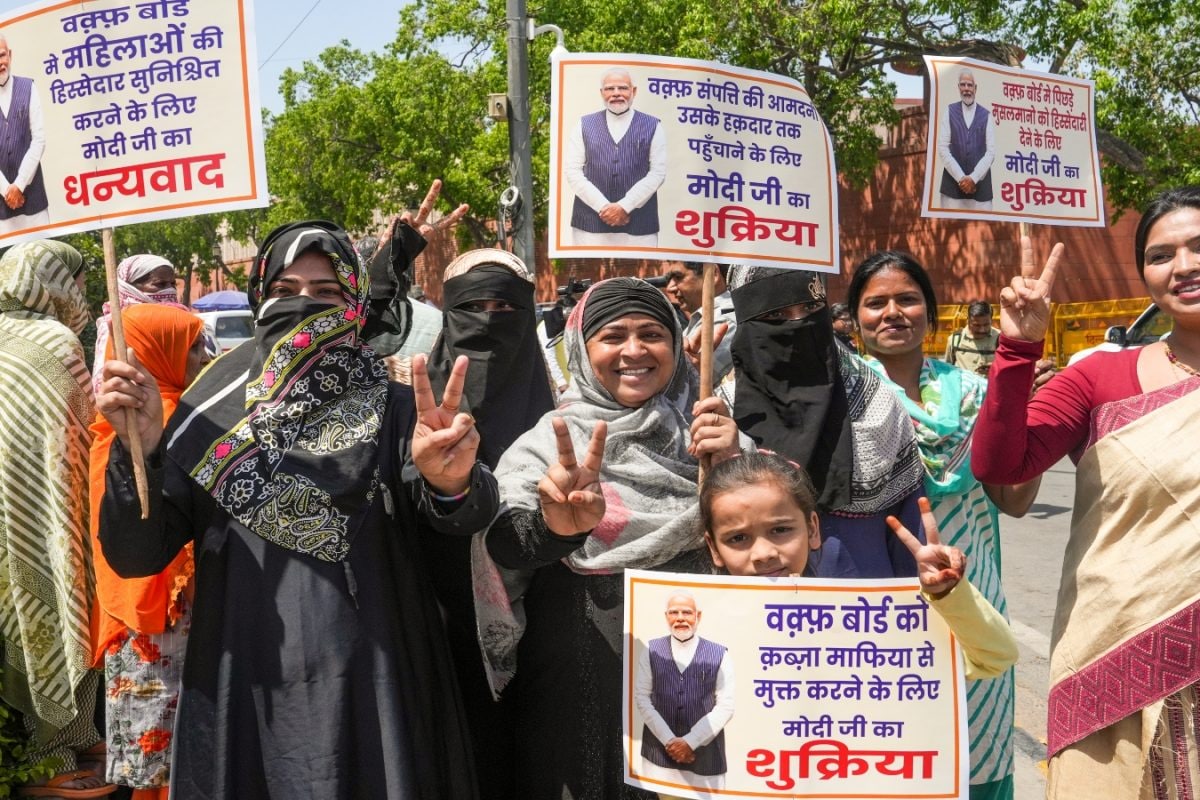The Waqf (Amendment) Act, 2025, muscled through by the Modi government last week, isn’t just a...
Read More My grandmother had a saying: “The land beneath your feet is your spine — lose it, and you’re spineless." She’d knead the dough with hands weathered by that earth, her words sinking in only now, watching the Waqf Board strip that spine from women like my friend Sameera, a Muslim widow battling its greed. The Waqf (Amendment) Act, 2025, muscled through by the Modi government last week, isn’t just a law — it’s a reckoning.

For Muslim women like us, silenced for decades by male-dominated boards and hollow “secular" promises, it’s a chance to stand tall. The Waqf Board’s a giant — 870,000 properties, 940,000 acres worth over a lakh crore rupees, third only to the Indian Railways and Indian Armed Forces. It’s supposed to fund mosques, schools, and hospitals — noble stuff.
But dig into it: 70 per cent of that land is lost to encroachments, lawsuits, or sheer opacity. Entire villages — like Tamil Nadu’s Thiruchenthurai, with its 1,500-year-old temple — get claimed overnight, leaving families gutted. Women like Sameera bear the brunt.
Her husband died in 2019, leaving her a Meerut house — her anchor. Then the Waqf Board swooped in, waving a vague “historical claim." No proof, no talk — just a notice.
Three years later, she’s still in court, bangles sold to pay lawyers, raising two kids on grit. “They don’t see us," she told me over lukewarm chai. Why would they? We’ve never had a say.
That’s the core rot: Waqf Boards, all men and no transparency, locked us out. Land meant for schools and hospitals got misused — no woman at the table to demand why. The 1995 Waqf Act didn’t mandate our presence, and they didn’t care to invite us.
It’s systemic — look at Congress and the Shah Bano betrayal. In 1985, they overturned a Supreme Court win giving a divorced Muslim woman maintenance, all for appeasement votes. Who paid the price? Us.
They didn’t just rob us of rights at home — they stole our voice, our assets, our future. Hindu and Christian women got equal property rights, but 70 years on, Muslim women? Still waiting. Our Constitution promises equality, yet under Congress’s decades-long reign, we were shoved beneath it — again and again.
The so-called champions of minorities? A sham. When the 33 per cent Women’s Reservation Bill passed, only two of 456 MPs opposed it — both Muslim men. Congress and their “secular" allies defended hijab rows and CAA protests, pushing us forward as poster girls, then vanishing when Nikah Halala, polygamy, and Triple Talaq crushed us.
They called it culture; we knew it was cruel. It took Modi to criminalise Triple Talaq, to let us go to Hajj without a male guardian — silent barriers broken not by speechmakers, but by someone who acted. Where were these pro-Muslim voices when we needed education, freedom, and dignity? They made us the face of protests, never the focus of protection.
The Waqf (Amendment) Act, 2025, after a 12-hour Lok Sabha slugfest and a Rajya Sabha nod (128-95), is our megaphone. It mandates two Muslim women on the Central Waqf Council and state boards — no tokenism, but a structural shift. Land claims now face a collector’s scrutiny, sparing families like Sameera’s from whims.
Women’s inheritance gets a shield before Waqf dedications — a lifeline for widows and divorcees crushed by the old rules. Congress wails “unconstitutional," DMK cries “communal." Spare me.
This isn’t about faith — it’s about fairness. Kiren Rijiju nailed it: “Crores of poor Muslims will benefit." The old Waqf was a boys’ club cloaked in piety, with women as the fallout.
And the ripple effects? Monumental. With proper management, those 940,000 acres could sprout hospitals where mothers like Sameera don’t pawn their last rupee for a doctor, schools where her daughters don’t just scrape by but soar, and childcare homes giving kids a shot at a future. Telangana’s mapping 77,000 acres with IIT-Delhi’s help — it’s not a dream, it’s doable.
This isn’t just about reclaiming land; it’s about reclaiming lives. Every hospital bed means a child survives, every classroom means a girl learns, and every job on these lands means a woman stands stronger. For too long, being “pro-Muslim" meant ignoring Muslim women — Modi’s bill flips that script.
The opposition’s predictable tantrum doesn’t hold water. Congress didn’t fight for us — they denied us representation while preaching care. Their legacy? No inheritance reform, no voice, just platitudes.
Who really fought for Muslim women? The ones who made speeches or the ones who made laws? Modi’s done more — Triple Talaq gone, Hajj barriers lifted, now this. UP’s Yogi Adityanath calls it a “land mafia" buster, and he’s right — this is cleanup, not overreach. Is it perfect? No.
The collector’s new clout might spark turf wars, and the rollout could stumble. But for women like me, who’ve watched the Waqf Board turn homes into warzones, it’s a dawn worth chasing. I think of Sameera, her spine bent but unbroken, and my grandmother, who’d have grinned at this — a law that sees us, finally.
The naysayers can clutch their rulebooks, but out here, where the soil meets the soul, this is a beginning, not the end, for Muslim women, one reclaimed acre at a time. Amber Zaidi is an activist focusing on Gender-Based Violence (GBV) and Violence Against Children (VAC). Views expressed in the above piece are personal and solely those of the author.
They do not necessarily reflect News18’s views..
Politics

Opinion | The Old Waqf: A Land Grab Legacy And Boys' Club

The Waqf (Amendment) Act, 2025, muscled through by the Modi government last week, isn’t just a law — it’s a reckoning















